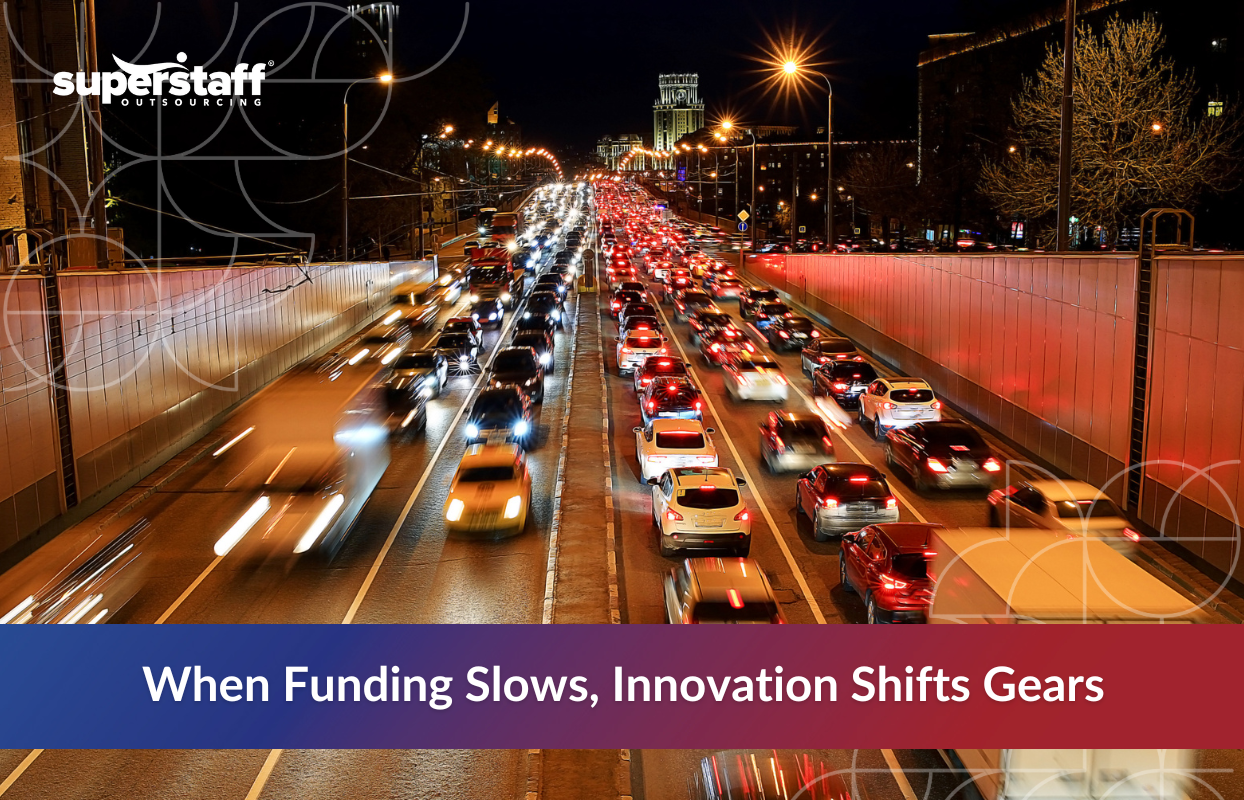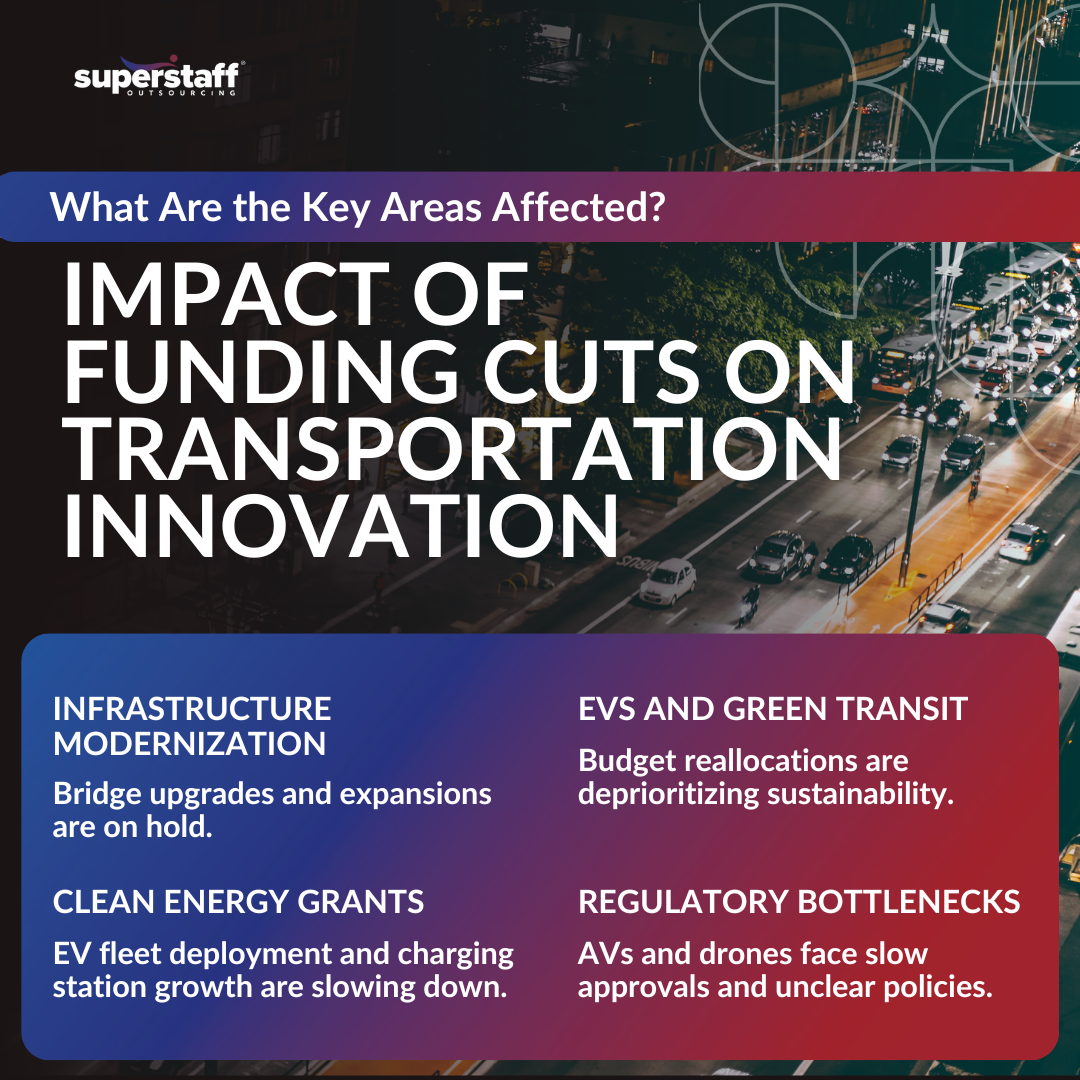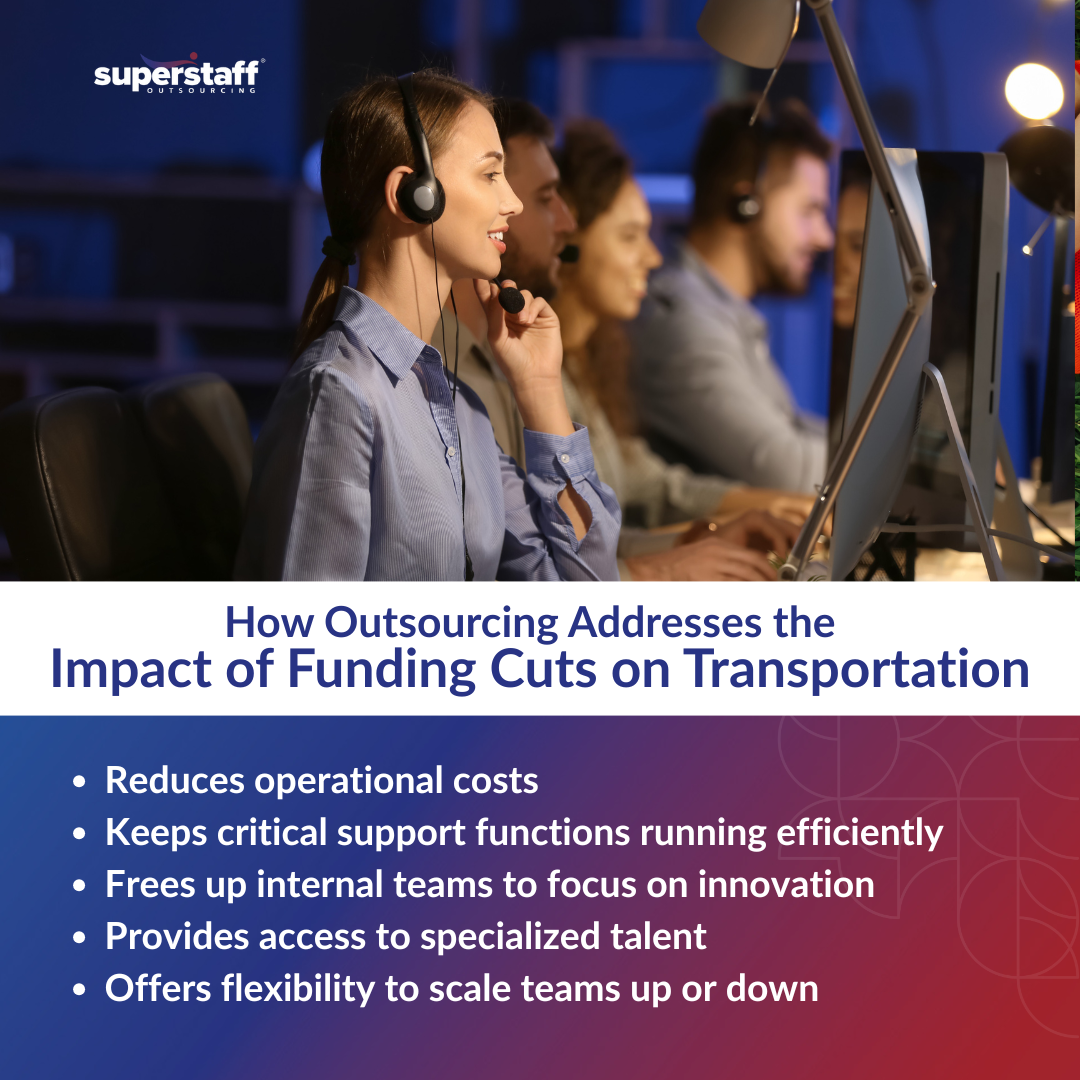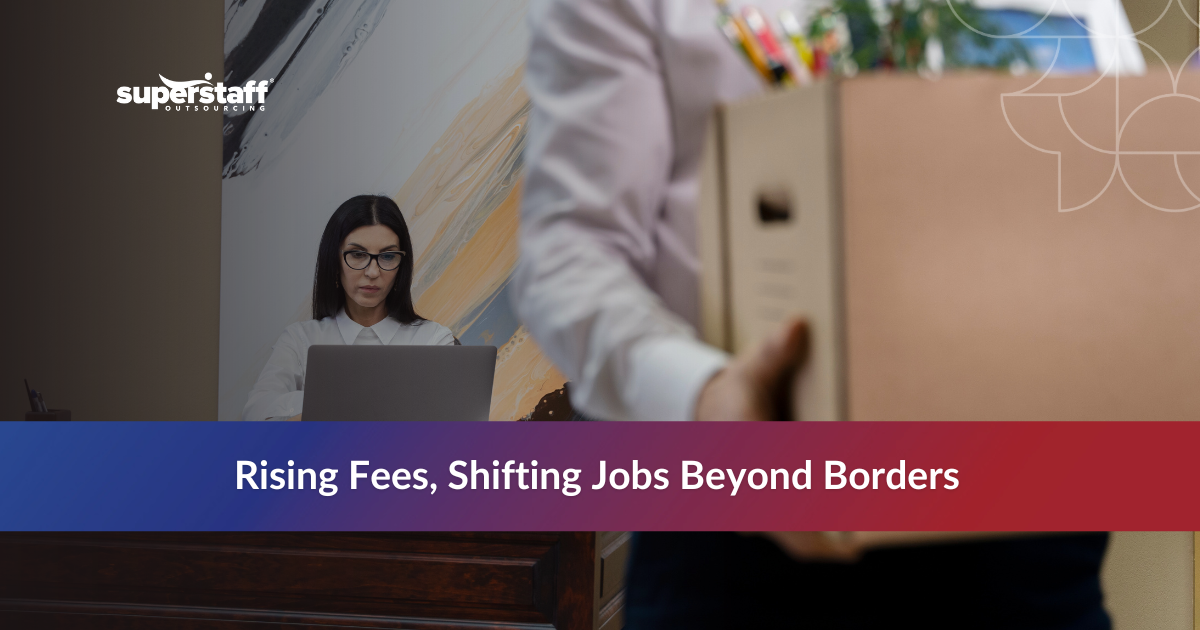
Innovation is no longer just about speed — it’s about survival.
The transportation sector finds itself at a crossroads as the U.S. navigates shifting policies and growing fiscal constraints. Infrastructure improvements are stalling, sustainability grants are dwindling, and once-promising tech-forward initiatives are facing unexpected delays.
The impact of funding cuts on transportation is being felt across the board — from startups piloting electric fleets to legacy players updating logistics networks. In response, companies are rethinking everything from R&D timelines to workforce structures.
This blog explores how transportation innovators respond to these policy disruptions and why outsourcing is quickly becoming a key strategy for staying agile.

By tapping into global support models and flexible operational setups, forward-thinking organizations are learning how to adapt — and even thrive — in the face of uncertainty. If you’re a transportation leader looking to future-proof your innovation roadmap, this is your guide to turning challenge into opportunity.
Policy changes are disrupting the pace and funding of transportation innovation.
Over the past decade, innovation in the transportation sector has been fueled by ambitious federal initiatives focused on sustainability, efficiency, and modernization. However, recent policy shifts are disrupting this momentum, creating gaps in funding, delaying project execution, and throwing long-term planning into disarray.
In early 2025, the U.S. Department of Transportation issued a memo announcing a freeze on certain federal transportation funds as part of a broader cost-cutting directive. This freeze impacts transportation infrastructure grants and delays new project approvals, affecting ongoing and planned projects nationwide.
Additionally, the White House Office of Management and Budget temporarily paused all federal funding in January 2025, creating uncertainty for public transportation funding and leading to potential delays and reevaluations of projects dependent on federal assistance.
Pullbacks in Federal Support
Federal support for electric vehicles (EVs), smart transit systems, and green logistics is seeing a noticeable decline. With budget reallocations prioritizing other sectors and the uncertain trajectory of green energy legislation, many transportation companies find their projects underfunded or paused indefinitely. This sudden shift is forcing leaders to make difficult decisions about where to allocate limited resources.
Delays in Infrastructure Investment
Infrastructure modernization projects that once seemed inevitable are now stalled due to policy uncertainty and fiscal tightening. Cuts in government funding for transportation infrastructure have put urban transit systems, bridge and rail upgrades, and highway expansions on hold in several states. As a result, transportation planners are forced to work around outdated systems that can no longer meet modern demands. These delays hinder progress in building more connected, efficient, and sustainable mobility ecosystems.
Reduction in Clean Energy Grants
Clean energy grants have long served as a lifeline for transportation innovators, particularly those investing in EV technologies, hydrogen fuel cells, and electric freight solutions. The rollback of these grants has significantly slowed the rollout of electric vehicle fleets and charging infrastructure. For many smaller companies, the loss of grant funding is a make-or-break situation, stalling their ability to scale.
Regulatory Bottlenecks for New Technologies
Innovation in transportation isn’t just about building new tech — it’s also about navigating complex regulatory landscapes. As policies shift, regulatory clarity is lost. Autonomous vehicles, drone-based logistics, and AI-powered traffic control systems are experiencing delays due to a lack of cohesive federal guidance. Companies face lengthy approval processes, fragmented state-level regulations, and increased safety and data compliance scrutiny.
A Climate of Uncertainty
These combined pressures are creating a climate of uncertainty for transportation stakeholders. Companies can no longer assume public funding will be a reliable foundation for innovation roadmaps. The situation underscores why transportation innovation depends on public and private funding — a balanced model that leverages the stability of public investment and the flexibility of private capital.
As traditional government support becomes less predictable, leaders across the industry are rethinking their strategies, evaluating alternative funding sources, and considering new operational models to sustain momentum. In response, many companies are rethinking how to sustain momentum without guaranteed public funding.
Innovation is shifting from government-backed to market-driven.
As government resources grow more limited, companies are turning inward and tapping into private capital. This shift emphasizes agility, efficiency, and ROI in a way that traditional public funding cycles often do not.
- The rise in public-private partnerships in transportation reflects a shared risk and shared reward model, helping projects move forward despite federal slowdowns.
- Lean innovation practices enable faster pivots and smaller, more iterative solutions that reduce risk while delivering results.
- Greater accountability for ROI in pilot programs ensures that transportation companies remain focused on commercial viability and scalability.
To stay lean and agile, many are restructuring their operations, and that’s where outsourcing plays a role.
Outsourcing helps transportation companies stay competitive during periods of uncertainty.
By leveraging offshore and nearshore talent, companies can keep critical support functions running smoothly while controlling costs. This operational flexibility helps them respond quickly to policy changes, market shifts, or internal challenges.

Administrative and Compliance Support
Outsourced support for compliance documentation and R&D administration ensures transportation companies can keep pace with complex regulatory requirements across multiple jurisdictions. Offshore teams can handle tasks like permit applications, emissions reporting, and safety compliance logs, reducing internal workload and risk exposure.
Customer Experience and Technical Support
Global CX teams provide real-time assistance for users of smart mobility apps, ride-sharing services, and logistics tracking tools. These teams are equipped to resolve technical issues, guide user interactions, and deliver consistent service quality across regions and time zones. In multilingual markets, outsourcing enables localized support, enhancing user satisfaction and brand loyalty.
Back Office and Operational Efficiency
Back office outsourcing covers a wide range of tasks that are essential to daily operations but don’t require on-site presence. These include parts procurement, inventory tracking, fleet performance analytics, invoice processing, and financial reconciliation. Outsourcing these functions allows transportation companies to streamline operations, reduce errors, and speed up decision-making.
Workforce Agility and Strategic Focus
The most significant advantage of outsourcing during periods of uncertainty is the ability to scale resources up or down as needed. Whether launching a pilot program or responding to fluctuating demand, transportation firms can adjust their support operations without going through long hiring cycles. The result: internal teams remain focused on core innovation, product development, and strategic growth initiatives.
The result: companies can redirect internal teams toward high-impact innovation.
Strategic outsourcing enables tech-enabled transportation to keep scaling, even during economic headwinds.
Despite tighter budgets, transportation companies still need to meet rising consumer expectations. Strategic outsourcing allows for smart scaling without compromising quality.
- Scalable customer support solutions support ride-share, e-scooter, and EV platforms as user bases expand.
- Outsourced software QA and testing help ensure that autonomous vehicle and AI-powered logistics tools are safe, functional, and compliant.
- Localization and multilingual support open doors for international expansion, enhancing accessibility and customer experience in global markets.
But the success of outsourcing hinges on working with the right partners.
Choosing experienced outsourcing providers ensures innovation doesn’t lose its edge.
Not all BPO partners are equal. In the transportation sector, the right provider must offer more than just human resources — they must understand the regulatory landscape, industry-specific challenges, and the pace of innovation.
- Familiarity with transportation and logistics workflows ensures faster onboarding and alignment with industry standards.
- Compliance with tech and privacy standards helps maintain trust and operational integrity.
- Flexible delivery models can scale up or down depending on seasonality, pilot program success, or policy changes.
As the transportation landscape evolves, adaptability becomes the ultimate advantage.
Navigating the Impact of Funding Cuts on Transportation With Smarter Strategies
With policies shifting and funding uncertain, transportation innovators must embrace new strategies, and outsourcing is proving essential.
From regulatory support to tech-driven CX, outsourcing helps companies remain lean, agile, and growth-focused despite budget constraints. That’s where SuperStaff comes in.
With comprehensive outsourcing solutions tailored to the needs of the transportation sector, SuperStaff supports everything from customer experience and compliance to R&D support and back-office operations.
Public funding may fluctuate, but innovation doesn’t have to stall. Explore how SuperStaff can help your transportation company scale innovation, stay compliant, and move forward, no matter the policy climate.






